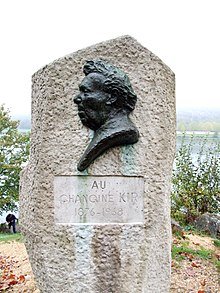Félix Kir
Félix Adrien Kir , called Canon Kir (born January 22, 1876 in Alise-Sainte-Reine , † April 26, 1968 in Dijon ) was a French canon and politician . He gave the mixed wine drink Kir its name.
biography
Kir was born in Alise-Sainte-Reine in the Côte-d'Or department , about 60 km northwest of the Burgundian capital Dijon . He grew up in humble circumstances and from 1891 attended the seminary (Petit Seminaire) in Plombières-lès-Dijon and then the Grand Seminaire in Dijon. He was ordained a priest on June 29, 1901 in Dijon.
The pastor
From 1904 he worked as a vicar in Notre-Dame de Dijon, where his sermons were greatly appreciated by the population because of his clear words. In the region around Dijon he was pastor in various parishes, for example in Bèze from 1910 to 1924, and later in Nolay . After the war he appeared as a Catholic speaker in many meetings.
On November 21, 1931 he was appointed canon (Latin form: Canonicus ). Due to his pragmatic nature and his communication skills, his bishop soon appointed him editor-in-chief of the Catholic magazine "Le Bien du Peuple". This made him a public figure in Dijon and the surrounding area.
The resister
During the occupation of Burgundy in World War II, he took part in some Resistance actions . It made it possible for 5,000 French prisoners of war to escape in the Longvic camp . He was arrested and sentenced to death. The sentence was not carried out and Kir was released on December 7, 1940 after 57 days of imprisonment - at the intervention of the papal nuncio. With his courage to live and his dignity he earned himself the respect of the Germans.
Hardly pardoned, he continued his secret actions. He was arrested for the second time in January 1944 as a target of an assassination attempt by rioters. A 17-year-old fired an entire magazine at him. Despite his serious injury, he was able to successfully evade persecution by the Gestapo , and his reputation among the population helped him.
The politician
In 1940 he was elected to the Dijon City Council for the first time . After the liberation he became Lord Mayor of Dijon. Re-elected several times, he held this office for 23 years. From 1945 to 1967 he was a member of the General Council of the Côte-d'Or, deputy for the Côte-d'Or and a member of the French party CNI . From 1953 to 1967 he was the age president of the French National Assembly .
He achieved great merits in the renovation of the old town of Dijon. At his suggestion, an artificial lake was created near the city that bears his name - »Lac Kir«.
Felix-Adrien Kir founded the town twinning between Mainz and Dijon in 1958 together with the mayor of Mainz , Franz Stein ; this is one of the oldest German-French city partnerships. Over the course of time, he connected Dijon with more than 20 other foreign cities, with the safeguarding of peace through reconciliation being his top priority: according to his motto, the peoples had to get to know and respect one another so that they would not go to war again.
Kir consequently became a protagonist of good Franco-German relations. He knew how to win over war participants as well as members of the Resistance and concentration camp inmates from Dachau and Buchenwald for the reconciliation. In addition to the town twinning with Mainz, he was a co-founder of the "Rhineland-Palatinate / Burgundy partnership", which he initiated in 1953 and which was proclaimed on February 25, 1957 as a circle of friends of the same name. This form of binational regional partnership is still unique today.
The person
He was a confident, unsophisticated person - an original. He was known for his indomitable determination and instinct for the politically feasible. If necessary, he did not hesitate to take the kepi to direct traffic around the Dijon town hall. He was the last priest to be seen with his cassock in the ranks of the National Assembly.
His preferred aperitif was white wine with a dash of crème de cassis , which is now called kir in his honor .
In 1952 he first granted the Lejay-Lagoute house the exclusivity of the name. Later, in order not to disadvantage the other liquor dealers in Dijon, he also allowed them to use his name.
The variant "Double K" was created in 1960 in connection with a meeting with Nikita Khrushchev (French: Nikita "K" hrouchtchev ) by the cafes in Dijon: white wine + cassis + vodka.
Awards
- In 1945 he was made a Knight of the Legion of Honor .
- In 1958 he was awarded the Great Cross of Merit of the Federal Republic of Germany .
- On June 13, 1964, Kir became an honorary citizen of Mainz.
- On January 24, 1976 Dijon inaugurated a statue at Lac Kir in honor of Felix-Adrien Kir.
literature
- Wolfgang Balzer: Mainz. Personalities of the city's history. Kügler, Ingelheim am Rhein 1985, ISBN 3-924124-01-9 , page 46 f.
- Wolfgang Götz: Rhineland-Palatinate, Burgundy. Model of an international partnership. A documentation. = Bourgogne, Rhenanie-Palatinat. v. Hase & Koehler, Mainz 1967 ( series of publications by the Institute for Citizenship Education in Rhineland-Palatinate 10, ZDB -ID 1412966-8 ).
Web links
- Biography ( Memento from October 4, 2007 in the Internet Archive )
| personal data | |
|---|---|
| SURNAME | Kir, Felix |
| ALTERNATIVE NAMES | Kir, Felix-Adrien; Kir, canon |
| BRIEF DESCRIPTION | French canon and politician, member of the National Assembly |
| DATE OF BIRTH | January 22, 1876 |
| PLACE OF BIRTH | Alise-Sainte-Reine |
| DATE OF DEATH | April 26, 1968 |
| Place of death | Dijon |

